Having now completed most all of what FFXIII-2 has to offer according to both the trophy screen and the challenge the end-game activities provided, I'm ready to go into my thoughts on the game.
Whenever you talk about a Final Fantasy game it's usually prudent to establish what regard you hold the previous games in. More likely than not, those reading this have played a previous game and were either turned off by the experience and now look on quizzically with each new release, or are eager for new entries in the inappropriately named series.
I started with and loved VII, was perplexed by VIII, never really got into IX, I adored X, I was disappointed with X-2, I did not play XI, I loved XII, I was indifferent towards XIII, I liked Tactics Advanced and Tactics A2, VII: Advent Children was silly.
It's impossible to talk about XIII-2 without going into the fan reaction towards XIII which ranged from incredulity to disappointment. If some sites and sources are to be believed then the furore over the linear environments, lack of towns, extensive background reading etc. were deal breakers for many people. The problem with this mentality is that it presents a list of things which fans were expecting from the game and were not provided with. But this list only masks the problems with XIII which were more difficult to describe and were set into the foundations of the game. These are exactly the same problems which plague XIII-2 because the surface flaws, that fan list, has been addressed and they're problems which are core to the RPG experience: characters and story.
Characters
Putting aside the semantic argument of whether any Final Fantasy game is an RPG, it's safe to say that the protagonists and plot are absolutely key to the experience of any of the games because fundamentally they tell a story. This isn't to give the gameplay elements short shrift, but long term enjoyment is often about whether you related to or empathised with the characters and were energised, saddened or simply moved, however slightly, by the story.
XIII didn't forget that, it just didn't do a great job of it. The cast of characters was eclectic as expected but out of the six core and other secondary characters, I came to enjoy the company of only three: Lightning, Sazh and Fang. Lightning's no-nonsense approach and singular mindset on saving her sister was refreshing and her dynamic with Sazh, the exasperated father mourning for his son, was brought in far to early in the story to be appreciated. Fang meanwhile was almost feral in her demeanour which contrasted so well to thermoset curves of everyone else. By the end of the game, it was obvious who your favourite characters were, and in Venn diagram of great and terrible characters, Vanille, Hope, Snow and Serah commonly existed solidly in the latter.
So why would XIII-2 base an entire game around three out of those four? It beggars belief as not one of them, neither Hope, Snow or Serah is any more endearing. Hope has now graduated to the bishie phase of his development and looks stoically thoughtful throughout; Snow meanwhile grows a cyber-mullet, and Serah... Serah whines more than Hope. Two out of three of the most tolerable characters meanwhile are almost entirely absent. Sazh is given lip service towards the end of the game in time for his upcoming DLC while Fang is safely ensconced in crystal so her interaction with the story is limited to a single dream.
The issue, and it's a huge one, boils down to personality and chemistry: specifically the lack of both. Thinking back to some of the other Final Fantasy games - every new one of course invites comparison - and remembering groups like Barret / Tifa / Cloud in VII, or Yuna / Tidus / Lulu / Auron in X, or even the brilliant Fran / Balthier and Asch / Vaan combination in XII, conversations and situations where the characters sparked off one another bubble up from memory. XIII-2 has none of this. Snow, supposedly Serah's fiancée, has been absent for years at the start of the story, but everyone just accepts this, Serah included. Where's the anger? Where's the passion? Where's the... emotion? Their position as future husband and wife feels cosmetic, there is no connection, even when they meet later in the story there are no longing glances or forlorn hand holding - where's the love?
This disconnect is tied to the lack of a party - far more reminiscent of X-2's costume sphere system except worse as the third spot, instead of being filled by a death-metal band dropout, is now populated with a personality-less monster. So at any important juncture, there are only ever two characters available for real development.
Serah's counterpart Noel Kreiss, the interloper into the pantheon of protagonists, is the only protagonist to have a worthwhile motive for tromping around the timeline. Ignoring that his first name is my last which makes for very confusing spoken conversations, his status as the last human ever born makes him forthright and seem very dependable if not slightly meat-headed at times. Unlike Serah and Snow, the connection between Noel and Yeul (his Yeul) is plain to see and all the more touching because of it. Simple things like the daydream of being able to hug her again speaks so much more than the clumsy dialogue ever could.
There is a litany of missed opportunities for developing and humanising the characters which comes down to unimaginative writing. Serah has been searching for her sister across time and space, and when she finally materialises in front of her, no hug? Just stilted questions on paradoxes?
Thankfully there is an exception to this cavalcade of disappointment in the shape of Caius, the antagonist extraordinaire. His full worth isn't truly exposed until the ending - until then he is an unknown aggressor with an immortal body and an impractical Soul Calibur-esque greatsword. But his motivation, his raison d'etre, is phenomenal and the pithy responses from the protagonists pale in comparison. More than anything he is empathetic, as someone who has lived for eons and has seen the people he cares about, that he swore to protect, fall his actions are not only justified but inevitable.
So from a canon of characters established in XIII, the most infuriating are given leading roles while others are relegated to also-rans. It's telling that those introduced in this game are the stronger ones, even the comedy Moogle is more endearing than Vanille could ever be. There are still giant missteps in the writing and in the end Hope and Serah limp over the "tolerable" finishing line ready to start on the "interesting" character marathon.
This is to say nothing of some of the secondary characters such as Alyssa who have all the character design traits of an important do-gooder (multiple belts), but none of the exposition. She is even ousted as a collaborator with the big bad in one of the post-story missions which is neither contextualised or explained. This however, is a key example of the second and most critical issue with XIII-2.
Story
A good story can make up for a lot of downsides in an RPG. XIII-2 doesn't have a great or even a decent story and this is after an almost complete tonal and narrative shift from XIII. The fal'cie and l'cie naming spaghetti is now more or less gone and the pseudo-political backdrop and techno-deities are ignored for a good ol' fashioned proper god, Etro, and a time-travelling plot spanning seven hundred years.
On paper this sounds excellent: let's ignore's the flimsy connection between the two games as the sequel moniker implies. Except the time travel here isn't thoughtful or even thought-out, it is used as a conceit to shotgun blast jargon at the player that even on a cursory listen is utterly daft. Even the most incidental characters spouts gibberish of paradoxes and time-space distortions and rifts in space-time - it's enough to put Star Trek to shame.
Jargon aside, the time travel element is used ham-fistedly and prime opportunities for narrative nectar - watching as friends and locations change, decay and die over time - are completely ignored. Instead, every single character finds a way to leap through time like the protagonists Serah and Noel do. Whether that's implied with Sazh, stasis with Noel or a time-travelling motorcycle with Snow. And yes, that's the same motorcycle made out of the two lady eidolons from the first game.
This is the worst case then. That time travel, a plot element I cherish so, is butchered to provide a reason to change the weather in the same locales and advance a story started in the closing seconds of XIII. This is compounded by the default view of the level select screen, the Historia Crux, which runs from left to right like a timeline but branches off to drastically different periods. It's confusing until you realise the line is advancement through the game's narrative rather than through time as one would perhaps expect.
The minutiae of the story shows flashes of brilliance but are never capitalised on. Noel for instance, is the last human ever born, in the far future when the sky has fallen and the land is barren, he is the final child. It's an origin story that's wonderfully evocative but beyond the first few gobbets of exposition, has little effect on his character. Caius, in the climax says more about Noel than an entire game's worth of development could "You don't like to kill anyone. You, the last human, understand the true meaning of life." Where was this kind of writing when I was shearing sheep or delivering trinkets?
Perhaps the most criminally disappointing story thread is that of Serah. Her affinity with Yeul, the cursed oracle of Pulse, is not made apparent outside of dialogue, only in the closing moments when she shares the same fate. It was certainly signposted but never expanded upon and the reveal comes off more as a "huh" rather than a tear-jerking denouement ala. X. Her search for her sister Lightning meanwhile is just as tepid and lacks the impetus needed to maintain interest. The opening scenes hint at attempting to find a gate to Valhalla where Lightning now supposedly resides but then gets lost in dealing with the intangible fall of Cocoon and defeating Caius who throughout has opaque motivations.
Individually then the strands of story disappoint - Serah and Noel's time skipping adventures, the fall of Cocoon, the endless battle of Lightning - but together they are muddled and too disparate. At no point do you as a player really know what you're trying to advance. Is it the search for a sibling, the saving of the world, the vanquishing of evil? It's as if someone had a checklist of narrative sources and decided to throw them all in, making each as bland as the other rather than one of them brilliant.
The world of Pulse and Cocoon with its organisations and denizens is strong, that was never the issue with either XIII or XIII-2 and even the introduction of Academia, apart from sounding too much like Macademia (nuts), is intriguing but not explored. The world building is certainly not up to the standard of XII with its nation states and political machinations, but nor is it a believable setting like the journey through X or VII, it's all just...
Spectacle
To say anything of the artwork of XIII-2 is to be in awe. This is the fidelity of a high budget, whether incidental crowd members, the texture of an anti-gravity jump, to the grand sweeping vistas of locations like the Archelyte Steppe or the crumbling of a planet-sized crystal pillar. There is not a corner cut.
Many people play the Final Fantasy games for that spectacle. When in-game graphics were relatively crude, that came from the full motion video sequences ushered in by CD-ROMs and then DVDs. The jump in fidelity was pronounced and it was enough to put your controller down and bask in the some of the most impressive visuals available in video games, rivalling even the most revered from studios like Blizzard.
It's a credit to the Crystal Tools engine used by XIII-2 that the difference in visual quality is vanishingly slim between in-game and pre-rendered scenes and only the opening and ending sequences are out-of-engine. The changes are still only cosmetic: the ladies' lips look fuller, their eyes shine brighter and their hair sways invitingly in the breeze.
But for all its grandeur and awe, like the story, it never feels part of a whole. XIII suffered from this less acutely but the lack of a "big picture" view of the world, be that the floating Cocoon or Pulse below it, means all of the locations are microcosms. The accompanying dialogue tells me where Bresha is, and the position of Cocoon gives me an idea of where New Bodhum is, but nothing about how they all lock together.
Neither X or XII featured the traversable world map that all previous games had, however X obviated the need for one by presenting a journey. From Besaid to Djose to Zanarkand the locales spilled into one another like water and though the presence of map buried in the menus was pleasant, it was unnecessary. XII on the other hand needed one to glue together the different regions and their spats with each other, but more than that the art-style and mood remained consistent across the locales which, again, contributed to a cohesive world.
XIII and XIII-2 on the other hand have neither an interactive or static world map. We are told but never shown where places are. XIII-2 suffers even more due to the time-travel mechanic but even then, as a player were are shown an arena surrounded by walls and ceilings - some hidden others not - and never allowed to know how the Archelyte Steppe could ever lead to New Bodhum. Or how the impossible space of XIII's opening could ever tie in with the rest of the Cocoon.
The result then is a beautiful, stunning world - Academia switches from rain soaked, Blade Runner-esque sci-fi to Star Trek utopia - but it's all just curtain hanging. There's nothing behind. It's ironic that the Void Beyond with its floating islands of masonry and gnarled trees is just as isolated as the most lush and verdant of plains on Pulse. It's sad that it would have taken so very little - when compared with the construction of these new locations - to pull together a visual map of these places, and the benefit would have been astronomical.
This is not a nostalgic cry for a world map or any other kind of system but a desire for a better connected world. One where there is a journey and a story in the environments themselves rather than immensely pretty but completely static pictures. Many of the systems which are already available though - the ones which make up the interactive rather than ephemeral aspects of XIII-2 - don't need changing because they're some of the best the series as a whole have ever offered.
Systems
The ATB system has been chopped and screwed, mutated and subsumed so many ways in the different iterations of Final Fantasy that its original turn-based line-dance is unrecognisable in recent instalments. A remark made during the creation of XIII was the desire for more visual fighting, akin to the tomfoolery found in the FFVII: Advent Children film. You certainly get that here, but the biggest change is from a micro-management point of view.
You pick a role and let the computer work out the best moves for your other party members and, optionally, let the computer work out the best moves for your character. You can queue your own if desired, but you are rarely forced to. The difference is stark as you are now no longer manager the second-to-second actions of your party but orchestrating a strategy - I don't want to have to individually tell my party to heal, I just want to indicate I do.
The unfortunate side-effect of this is, outside of some end-game battles, this takes the form of press X to win. XIII-2 compounds this by making the fights so staggeringly easy that even on the dreadfully named "normal" difficulty, anyone who completed XIII will rarely break a sweat. It's especially bonkers when the paraphernalia of the Paradigm system - bar refreshes, profile switching to mitigate powerful attacks - is all locked away in the drudgery of tutorials and text screens. Adding insult to injury is a seeming regression whereby the computer assistance - automatically selecting the most wounded party member for instance - favours Serah and Noel over the third slot monster, regardless of how critically debilitated they are. Similarly the often daft choice of actions from the "auto-x" option beggars belief - throwing more lightning at an obviously resistant enemy is, frankly, the kind of intelligence I expect from Serah but not from my home console.
It's infuriating. Especially so when the menu-based interface could be streamlined to make interacting with a great system better. For instance, the slick animations block further input until their completion, meaning menus lag making it tedious to choose your own actions when the computer refuses to act sensibly. Similarly while I can repeat my previous custom actions, I cannot store my own bank of them, meaning switching between two different action sets is an exercise in annoyance.
Despite my vehemence, these are but small annoyances that accumulate. XIII-2 is rife with these, whether it's the clunky paradigm choosing or the Crystarium system which is implausibly more difficult to use than XIII's - an ode for the license board or sphere grids of old. There are several new systems, so clamoured for by fans: Chocobo racing! Slot machines! ... Monster recruiting? Diversions at the best of times, these are pale facsimiles of previous games with Serendipity a shade of the Golden Saucer or even the oddly addictive card game of VIII. Worse than that though is how useless they are, the Chocobo racing is entirely avoidable, even in the end-game, while the slot machine is the source of a particularly insipid reward requiring either boundless patience or a construct to hold down the trigger of a controller.
This frustration leads into the darkest area of the game: the Fragment system. Like Mario's stars, this is a collect-em-all, except here the ways of collecting are obscured by visuals effects and further squirrelled away in out of the way places. I would be unwilling to play any majorly numbered Final Fantasy game without a guide to hand, if not simply to avoid the controller destroying frustration of making a decision, be that levelling or chest opening, that cripples you further in the game. The benefit of the collecting is that it naturally creates a checklist of accomplishments and progress is measured by immutable numbers, that the method is so mediocre and difficult to decipher did not stop the organisational part of my brain, locked away in the primal centre, kicking in.
Conclusion
Short-sightedness is why XIII-2 exists in the way that it does. It's why there are egregious puzzle sections (although the "Hands of Time" puzzles were devilishly fun). It's why the soundtrack has the beautiful vocals of Origa on it but omits the best track used in the game, "Blinded by light" from XIII. The fans shouted for towns, shops, non-linearity and diversions. And Square Enix provided. But the fans don't know what they want. They know what they had, and they liked what they had, so when XIII didn't have these things, that's what was wrong with it. XII was similarly pilloried and reviled for its lack of a "proper" battle system and relying on MMO style functionality - but I'll be damned if the gambit system wasn't a joy to tinker with.
Square Enix and all of the creative team behind XIII-2 should have listened to that stubborn creative voice in their head - the one that still refuses to remake VII regardless of fan desire - and tried something else new. Damn the whining fans because if they kept giving fans what they wanted, like a musician always making the same music, it becomes predictable and boring.
Maybe this is just the repositioning that is needed by the much delayed Fabula Crystalis Nova series. The hanging edge of the story here indicates that more of XIII's universe is forthcoming and this is just a hiccup in the way Square Enix approaches modern console games. Games that have boundless artistry and tuned mechanics but which are increasingly mired in a combination of short sightedness and fan pandering.
So with all that said, what would be the one thing I would say to Square Enix? Don't listen to a word of this. Let your artists create and make whatever game you want to because what the hell do I know? I'm just a fan.
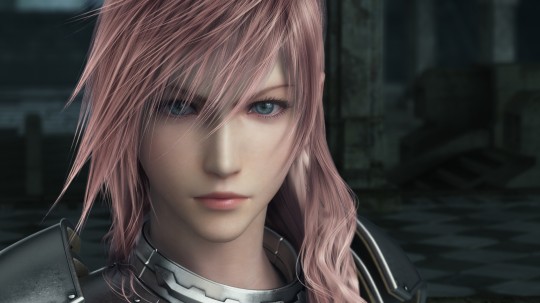
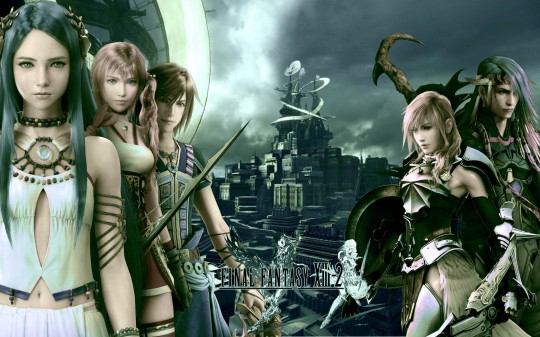
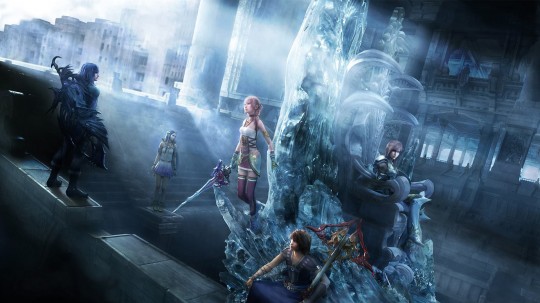
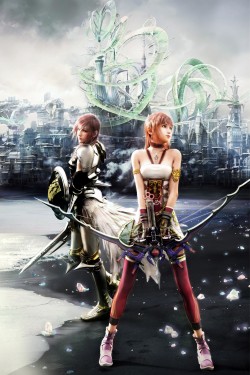
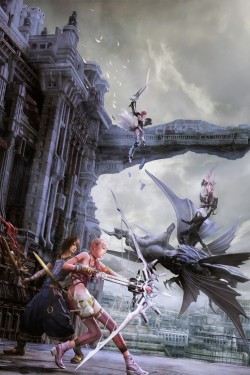
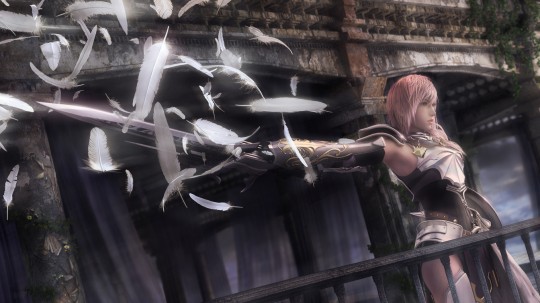
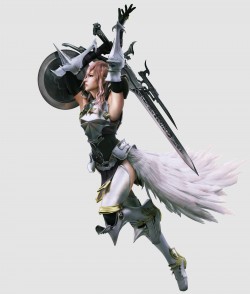
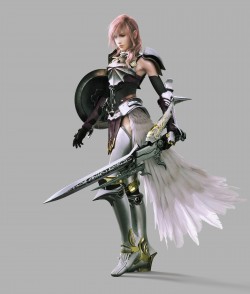
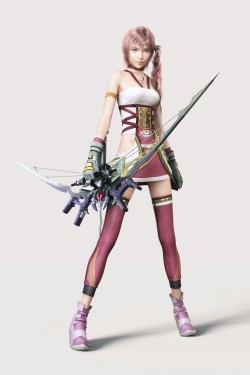
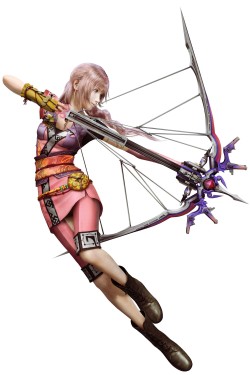
I don't really mind the ATB battle system much. Better than X-2's in my opinion, where it all mattered on your character's "speed." Atleast in XIII & XIII-2 everybody can charge up and attack within the same amount of time.
The storyline was pretty choppy to me. Whereas FF 13 was straightforward and direct, 13-2 is kind of all over the place, though maybe SE can't be blamed for that, since they were only trying to correct what fans said was wrong with 13.
PFFFT. And I couldn't agree with you more about how Serah never shows much emotion about Lightning, except in the flashback where she clutches Lightning's knife and cries at her sister's disappearance.
Overall, you had a very un-bias and good review.